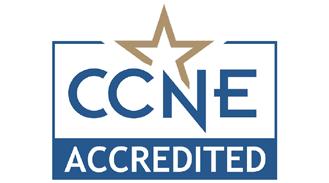DNP Nurse Anesthesia
in partnership with Somnia Nurse Anesthesia Program
Ursuline College partnered with Somnia Nurse Anesthesia Program, LLC in 2022 to create and operate Ursuline College with SNAP. Somnia Nurse Anesthesia Program, LLC is an independent, privately owned nurse anesthesia education company that provides nurse anesthesia continuing education and workshops across the country. The mission of Ursuline College with SNAP is to prepare residents to become nurse anesthetist with advanced, specialized knowledge and skills to meet the health needs of diverse populations and to serve as health care leaders.
Why become a CRNA?
CRNAs are part of a unique community. The collaborative nature of this role allows for personal growth and a sense of fulfillment in serving. Hard work and dedication are rewarded with competitive salaries. The National Board of Certification & Recertification for Nurse Anesthetists (NBCRNA) reports 2,800 CRNAs graduated last year, a number falling far short of the 7,600 positions needed by 2028 according to Bureau of Labor Statistics projections. As of 2022, new graduates from nurse anesthesia programs are required to have a terminal degree such as a PhD or DNP to enter into practice. This program meets those requirements and more.
Curriculum
The Ursuline College with SNAP curriculum is a full-time, 36-month format that prepares the baccalaureate-educated nurse to become a doctorally-prepared nurse anesthetist. The curriculum is designed to meet the standards of the Council on Accreditation of Nurse Anesthesia Educational Programs (COA).
The graduate receives a Doctor of Nursing Practice degree and is eligible to sit for the National Certification Exam (NCE) administered by the NBCRNA. After successful completion of this written exam, the graduate becomes a Certified Registered Nurse Anesthetist (CRNA).
All nurse anesthesia classes are synchronous and times may vary to account for different time zones.
Level 1
Spring: Total - 13 credits
NAP 510: Introduction to Nurse Anesthesia Profession (1)
NR 540: Advanced Physiology/Pathology (3)
NR 541: Advanced Health Assessment (3)
NR 700: Scientific Writing for Professional Nurses (3)
NR 702: Scientific and Theoretical Foundations for Advanced Practice Nursing (3)
Summer: Total - 11 credits
NAP 511: Applied Chemistry, Biochemistry, and Physics (1)
NR 542: Advanced Pharmacology (4)
NR 703: Epidemiology (3)
NR 709: Evaluation Strategies for Quality Improvement (3)
Fall: Total - 14 credits
NAP 512: General Principles of Anesthesia (4)
NAP 621: Pharmacology of Anesthetic Agents (4)
NR 701: Biostatistics for Outcomes Management (3)
NR 704: Analysis of the Evidence for Advanced Practice Nursing (3)
Level 2
Spring: Total - 14 credits
NAP 620: Advanced Anatomy, Physiology & Pathophysiology I (4)
NAP 623: Advanced Principles and Clinical Management (4)
NAP 651: Nurse Anesthesia Practicum I (1)
NR 707: Interdisciplinary Organizational Leadership (3)
NR 800: Project Identification/DNP Residency (2)
Summer: Total - 11 credits
NAP 622: Advanced Anatomy, Physiology & Pathophysiology II (4)
NAP 652: Nurse Anesthesia Practicum II (2)
NR 705: Methods for Conducting Evidenced-Based Projects (3)
NR 801: DNP Project Proposal Development/DNP Residency (2)
Fall: Total - 10 credits
NAP 624: Advanced Principles and Clinical Management II (4)
NAP 653: Nurse Anesthesia Practicum III (3)
NR 706: Advanced Healthcare Management & Policy (3)
Level 3
Spring: Total - 9 credits
NAP 630: Professional Aspects of Leadership (1)
NAP 661: Advanced Nurse Anesthesia Clinical Correlation I (3)
NR 708: Advanced Health Care Informatics (3)
NR 802: Project Implementation/DNP Residency (2)
Summer: Total - 5 credits
NAP 662: Advanced Nurse Anesthesia Clinical Correlation II (3)
NR 803: Dissemination/DNP Residency (2)
Fall: Total - 5 credits
NAP 631: Comprehensive Board Review (3)
NAP 663: Advanced Nurse Anesthesia Clinical Correlation III (2)
Admission Requirements
Students applying for admission must meet both the general requirements for admission to all graduate programs and the specific requirements of the particular program of study.
General Admission Requirements
1. Application & Essay: Submission of the Ursuline College
Graduate Admission application for the Doctoral Nurse
Anesthesia Track including an essay.
2. Application fee
3. Transcripts: Official transcripts from all institutions attended including undergraduate or graduate academic coursework whether credit was earned, the program was completed, or the credit appears as transfer credit on another transcript.
a. Transcript(s) must be forwarded to the Office of Graduate Admission directly by the issuing institution.
b. The completed baccalaureate or graduate degree in nursing must be from a college or university accredited by an accrediting agency recognized by both the U.S. Department of Education (USDoE) and the Council for Higher Education Accreditation (CHEA).
4. Two recommendations utilizing the required recommendation form. Recommendations attesting to the suitability of the applicant for graduate work should be written by appropriate professionals who can evaluate the applicant’s professional practice, leadership, interpersonal skills, communication, critical thinking, and judgment.
a. One recommendation must be from applicant’s immediate supervisor, the individual who completes the applicant’s yearly performance evaluations.
b. One recommendation should be from a professional colleague.
c. Optional: One recommendation from an academic faculty.
5. Curriculum vitae/resume: A curriculum vitae/resume indicating higher education institutions attended and dates of attendance, work experience, clinical experiences, and other activities.
6. Interview: Interview with the Admission Committee. Not all qualified applicants are offered an interview.
Academic Requirements
1. A baccalaureate or graduate degree in nursing from an accredited university.
2. Minimum cumulative GPA of 3.0 on a 4.0 scale, based on the combined academic record from all colleges and universities attended.
3. Minimum overall prerequisite GPA of 3.2, calculated from all coursework completed in Chemistry, Statistics, and Anatomy & Physiology (excluding separate laboratory courses). At least one course from each of these categories must have been completed within the past 10 years of the application deadline.
Professional Requirements
1. Current unencumbered RN license within one of the 50 states or U.S. Territories. Proof that all nursing licenses - whether current or inactive - are unencumbered. Potential students with encumbered nursing licenses will not be considered eligible for enrollment.
2. Minimum of one year of full-time critical care experience as a registered nurse at the time of application. Must be within three years of planned start date and from a hospital in the U.S., U.S. territory, or at a U.S. military hospital.
a. Certain units are not considered competitive for critical care experience, including: Post-Anesthesia Care Unit (PACU), Emergency Department (ER), Cardiac Catheterization Lab, and Step-down Units.
b. The COA defines a critical care area as one where, on a routine basis, the registered professional nurse manages one or more of the following: invasive hemodynamic monitors (e.g., pulmonary artery, central venous pressure, and arterial catheters), cardiac assist devices, mechanical ventilation, and vasoactive infusions.
3. An observation day with a CRNA in a hospital setting for 8 hours within the last two years.
4. Current Critical Care Registered Nurse (CCRN) certification.
Application Deadline
Please refer to our website for detailed information on application deadlines. The application for admission must be submitted online at ursuline.edu/apply.
Post-Admission Requirements (Prior to Program Start)
1. Current American Heart Association (AHA) certification in Basic Life Support (BLS), Advanced Cardiovascular Life Support (ACLS), and Pediatric Advanced Life Support (PALS).
2. Physical health assessment form
3. Submission of up-to-date immunizations
4. Federal background check and drug test





